 W
WTangara is a large genus of birds of the tanager family. It includes 27 species. All are from the Neotropics, and while most are fairly widespread, some have small distributions and are threatened. They are fairly small, ranging in size from 11.5–15 centimetres (4.5–5.9 in). This genus includes some of the most spectacularly colored birds of the world.
 W
WThe bay-headed tanager is a medium-sized passerine bird. This tanager is a resident breeder in Costa Rica, Panama, South America south to Ecuador, Bolivia and southern Brazil, and on Trinidad.
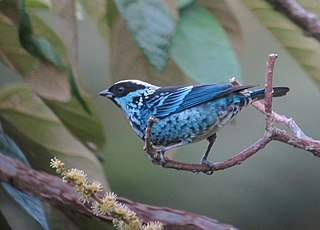 W
WThe beryl-spangled tanager is a small songbird of the northern Andes.
 W
WThe blue-and-black tanager is a species of bird in the tanager family Thraupidae. It is found in the Andes of Bolivia, Colombia, Ecuador, Peru and Venezuela, where it inhabits montane evergreen forest, dwarf forest, and secondary forest at elevations of 1,500–3,500 m (4,900–11,500 ft). It inhabits the highest altitude of any Tangara species, and is the only species from the genus that is found near the tree line. Adults are 13 cm (5.1 in) long and weigh 18 g (0.63 oz) on average, and are mostly blue with black masks, wings, and tails. The species shows slight sexual dimorphism, with females being slightly duller than males.
 W
WThe blue-browed tanager is a species of bird in the family Thraupidae. It is found in Bolivia, Colombia, Ecuador, and Peru. Its natural habitat is subtropical or tropical moist montane forests.
 W
WThe blue-whiskered tanager is a species of bird in the family Thraupidae. It is found in the Chocó of Colombia and Ecuador. Its natural habitat is subtropical or tropical moist lowland forests. It is threatened by habitat loss.
 W
WThe brassy-breasted tanager is a species of bird in the family Thraupidae. It is endemic to Brazil.
 W
WThe emerald tanager is a species of bird in the tanager family Thraupidae. It is found in Colombia, Costa Rica, Ecuador, and Panama. Described by the English ornithologists PL Sclater and Osbert Salvin in 1869, it is a medium-sized species that has a length of 10.6–13 cm (4.2–5.1 in) and a mass of 18–20.5 g (0.63–0.72 oz). It can be identified by its bright green plumage, with black streaking on the back and wings, and a black auricular patch and beak. It also has yellow on the crown and rump. The species shows slight sexual dimorphism, with the females being duller and having yellow-green in place of yellow on the head.
 W
WThe flame-faced tanager is a species of bird in the tanager family Thraupidae. It is endemic to South America and is found in the eastern Andes of Colombia, Ecuador, Peru and Venezuela. Its natural habitat is subtropical or tropical moist montane forests. It is a distinctive-looking species with black and opalescent green upperparts, opalescent green and buff underparts, and a deep red and yellow face. The subspecies lunigera lacks the deep red on the face, which is replaced with orangish-red.
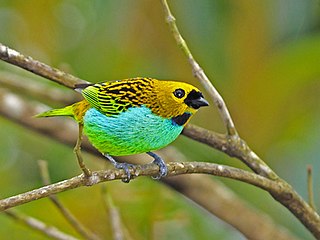 W
WThe gilt-edged tanager is a species of bird in the family Thraupidae. It is endemic to Brazil.
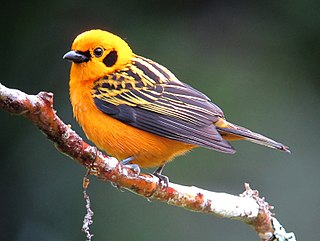 W
WThe golden tanager is a species of bird in the family Thraupidae. It is widespread and often common in highland forests of the Andes and Venezuelan Coastal Range in north-western South America.
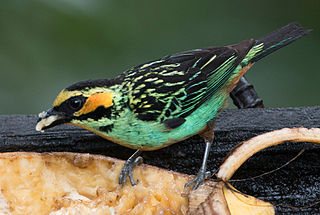 W
WThe golden-eared tanager is a species of bird in the tanager family Thraupidae. It is found in the eastern Andes of Bolivia, Colombia, Ecuador and Peru where its natural habitat is subtropical or tropical moist montane forests.
 W
WThe green-and-gold tanager is a species of bird in the family Thraupidae, the tanagers. It is one of 27 species in the genus Tangara.
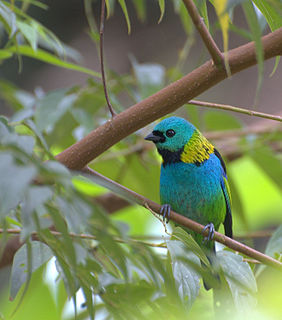 W
WThe green-headed tanager is a brightly colored bird found in the Atlantic forest in south-eastern Brazil, far eastern Paraguay, and far north-eastern Argentina.
 W
WThe green-naped tanager is a species of bird in the family Thraupidae. It is found in Colombia and Panama. Its natural habitat is subtropical or tropical moist montane forests. It is threatened by habitat loss.
 W
WThe metallic-green tanager is a species of bird in the family Thraupidae. It is found in Colombia, Ecuador, and Peru. Its natural habitat is subtropical or tropical moist montane forests.
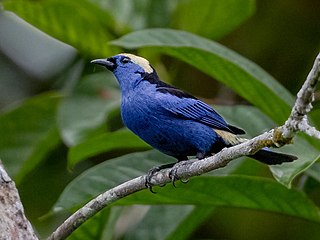 W
WThe opal-crowned tanager is a species of bird in the family Thraupidae, the tanagers. It is one of 49 species in the genus Tangara.
 W
WThe opal-rumped tanager is a species of bird in the family Thraupidae. It is found in the Amazon and Atlantic Forest of South America. The population of the Atlantic Forest has a far paler chest than the other populations, and has often been considered a separate species as the silvery-breasted tanager. Today most authorities treat it as a subspecies of the opal-rumped tanager.
 W
WThe paradise tanager is a brilliantly multicolored, medium-sized songbird whose length varies between 13.5 and 15 cm. It has a light green head, sky blue underparts and black upper body plumage. Depending on subspecies, the behind is yellow and red or all red. The beak is black and the legs are grey. It is native to the Amazon rainforest.
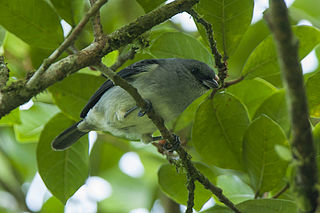 W
WThe plain-colored tanager is a species of bird in the family Thraupidae. It is found in Colombia, Costa Rica, and Panama. Its natural habitats are subtropical or tropical moist lowland forests and heavily degraded former forest.
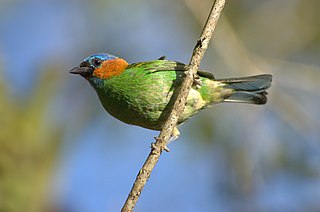 W
WThe red-necked tanager is a species of bird in the family Thraupidae.
 W
WThe rufous-cheeked tanager is a species of bird in the family Thraupidae, the tanagers. It is endemic to Venezuela. Its natural habitat is subtropical or tropical moist montane forests.
 W
WThe rufous-winged tanager is a species of bird in the family Thraupidae. It is found in Colombia, Costa Rica, Ecuador, Honduras, Nicaragua, and Panama. Its natural habitats are subtropical or tropical moist lowland forests and heavily degraded former forest.
 W
WThe saffron-crowned tanager is a species of bird in the family Thraupidae. Found in the northern Andes of Bolivia, Colombia, Ecuador, Peru, and Venezuela, it inhabits cloud forest, forest edges, and secondary forest, preferring areas with mossy trees. It is an average-sized species of tanager with a blue-green body and yellow head with a black forecrown, lores, orbital area, and chin.
 W
WThe seven-colored tanager is a vulnerable species of bird in the family Thraupidae. It is endemic to forests in north-eastern Brazil. It resembles the overall greener green-headed tanager; a species confusingly known as the seven-coloured tanager (saíra-sete-cores) in Portuguese.
 W
WThe silver-throated tanager is a species of passerine bird in the tanager family Thraupidae. It is found in Costa Rica, Panama, Colombia, Ecuador, and northeastern Peru. It inhabits mossy forests, montane evergreen forests, tropical lowland evergreen forests and forest edges, along with tall secondary forests and disturbed habitat with remnant trees and forest. It is 13 centimetres (5.1 in) long and weighs 22 grams (0.78 oz) on average, and shows slight sexual dimorphism, with duller female plumage. Adult males are mainly bright yellow, with a silvery-white throat bordered above with a black stripe on the cheeks, black streaking on the back, and green edges to the wings and tail. Juveniles are duller and greener.
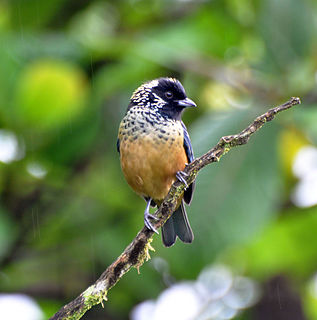 W
WThe spangle-cheeked tanager is a medium-sized passerine bird. This tanager is an endemic resident breeder in the highlands of Costa Rica and western Panama.
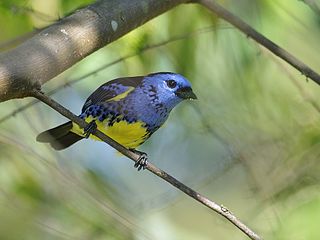 W
WThe turquoise tanager is a medium-sized passerine bird in the tanager family Thraupidae. It is a resident bird from Trinidad, much of Brazil, Colombia and Venezuela south to Bolivia. It is restricted to areas with humid forest, with its primary distribution being the Amazon, while a disjunct population occurs in the Atlantic Forest of eastern Brazil. The latter population is sometimes considered a separate species, the white-bellied tanager.